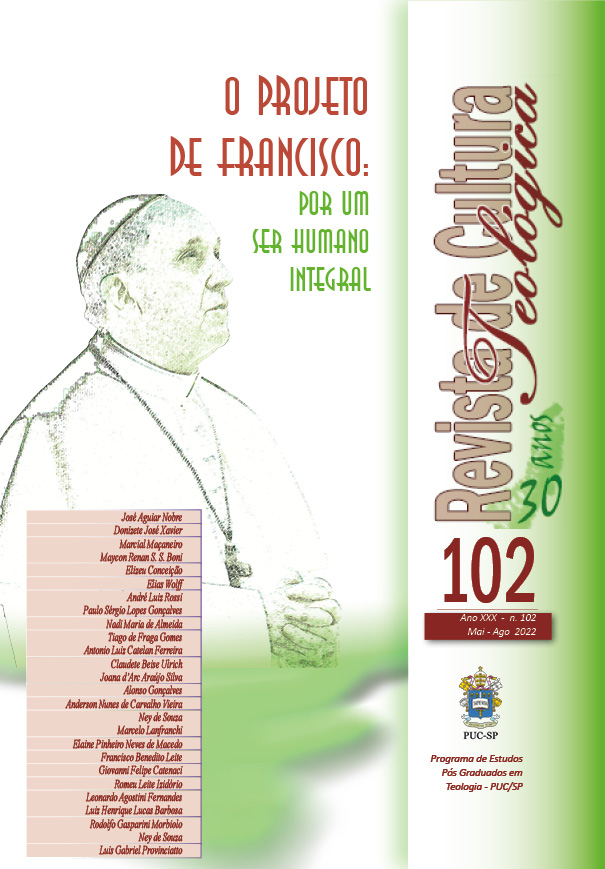Dialogue and encounter for an integral humanity
approximations between Buber and Pope Francis, based on Laudato Si
DOI:
https://doi.org/10.23925/rct.i102.58316Keywords:
Dialogue, Integral humanity, Relationship, Martin Buber, Pope FrancisAbstract
Pope Francis highlights the culture of encounter as a way of integral human fulfillment. His proposal invites us to reread Martin Buber, philosopher of dialogue, verifying the similarities between him and the Latin American pontiff. According to Buber, the human being is a being of relationship, with three spheres of dialogue: with nature, with human beings and with spiritual beings – a sphere that includes God. Among these three spheres, the second one, referring to humanity, Buber calls inter-human: a relationship in which the I finds the answer of the You. Pope Francis, in turn, includes these three spheres in the encyclical Laudato Si’: the relationship of the human being with the Earth, with the other human being and with God. In both, the relationship of the human being with the other characterizes the inter-human dialogue, in a dynamic of integral realization. In this article, the concepts, and correspondences between the two authors regarding inter-human dialogue are presented, from the perspective of integral humanity.
References
BARTHOLO JR., R. Você e Eu: Martin Buber, presença palavra. ed. Rio de Janeiro: Garamond, 2001.
BÍBLIA DE JERUSALÉM. São Paulo: Paulus, 2002.
BUBER, Martin. Do diálogo e do dialógico. São Paulo: Editora Perspectiva, 1982.
BUBER, Martin. Imagens do bem e do mal. Trad. Edgar Orth. Petrópolis: Editora Vozes, 1992.
BUBER, Martin. EU e TU. Trad. Newton Aquiles Von Zuben.10. ed. São Paulo: Centauro Editora, 2006.
BUBER, Martin. O caminho do homem: segundo o ensinamento chassídico. Trad. Claudia Abeling. ed. São Paulo – SP: Realizações Editora, 2011.
FRANCISCO. Laudato si’: sobre o cuidado da casa comum. São Bernardo do Campo – SP: Intergraf Industria Gráfica Eireli, 2015.
KUZMA, C.; TISI, L. C. P. Responsabilidade e cuidado com a casa comum: apontamentos teológicos a partir da encíclica Laudato Si’. Caminhos de Diálogo. Ano 8. n. 13. p. 308-319, 2020. Disponível em: <https://periodicos.pucpr.br/caminhosdedialogo/article/view/26948/24669>. Acesso em: 09 de out. 2021.
MARTÍN-VELASCO, J. La experiencia cristiana de Dios. 3ª ed. Madrid: Editorial Trotta, 1997.
SOUZA, J. N. A Laudato Si’ na perspectiva do método: “ver, julgar e agir”. Perspectiva Teológica. v. 48. n. 1. p. 145-161, 2016. Disponível em: <http://www.faje.edu.br/periodicos/index.php/perspectiva/article/view/3482/3587>. Acesso em: 09 de out. 2021.
VON ZUBEN, N. A. Martin Buber: Cumplicidade e diálogo. ed. Edusc: Bauru - SP, 2003.
ZAMPIERI, G. Laudato Si’: sobre o cuidado da casa comum – um guia de leitura. Teocomunicação. v. 46. n. 1. p. 4-23, 2016. Disponível em: <https://revistaseletronicas.pucrs.br/ojs/index.php/teo/article/view/24347/14944>. Acesso em: 09 de out. 2021.
Published
How to Cite
Issue
Section
License
Copyright (c) 2022 Revista de Cultura Teológica

This work is licensed under a Creative Commons Attribution-NonCommercial-NoDerivatives 4.0 International License.
Os autores concedem à revista todos os direitos autorais referentes aos trabalhos publicados. Os conceitos emitidos em artigos assinados são de absoluta e exclusiva responsabilidade de seus autores.

